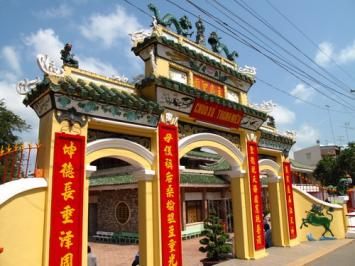Ba Chua Xu Temple was built in 1820, at the foot of Sam Mountain, Vinh Te Commune, Chau Doc Town, An Giang Province. Ba Chua Xu Temple is constructed according to the Chinese character “quoc”, has 4 square roofs, roofed with blue pile-shaped tiles. According to a legend, in the early 1800s, villagers found a statue of a lady dating to the 6th century in the forest. They built a temple in her honour, hoping that she would bring them better crops and better lives. This is why the marble statue of Ba Chua Xu, meaning “country lady” is worshipped. In the festival, worshippers touch her statue and ask for her protection and benediction.

Pilgrims flood Ba Chua Xu Temple Festival
Ba Chua Xu Temple Festival is the biggest folk festivity of Southern Vietnam. The festival is held annually from the 23rd to the 27th of the fourth lunar month with the ceremonies as follows:
The statue of Ba Chua Xu washing rite
During the days of the festival, various rituals are performed. On the first night, the statue of Ba Chua is bathed in perfumed water and she is also made to wear fresh robes for the occasion. Then Ba Chua’s discarded garments are cut into little bits and handed out among the worshippers. These are considered lucky charms to keep the possessor in good health and drive away evil spirits.
Tuc Yet rite
Tue Yet Rite commences after the ceremony of washing. During this ritual of the Ba Chua Xu Temple Festival, the worshippers appeal for Ba Chua’s recommendations to the heaven. A grand parade of dragon dance is presented along with it and is followed by a chanting ritual in Ba Chua’s temple. Lastly the Duc Boi rite is performed by a man from the village, who sings aloud for the well being of the country and mankind.
Participants dressed in smart traditional costumes stand on the two sides and the master of ceremonies stands in front of the statue of Ba Chua. The offerings include a white pig, a dish of pig’s blood and a little hair, called mao huyet, a tray of sticky rice, a tray of fruits, a tray of areca and betel, a dish of rice and salt, which are place on a table before the statue. The master of ceremonies and notables burn incense on the altar.
Xay Chau rite
The Xay Chau rite is performed after the Tuc Yet rite. In order to prepare for this rite, people replace the table before the altar with a drum. The master of ceremonies holds two drumsticks and says his prayers before the altar. After that, he dips a branch of willow into a water bowl on the left of the altar, and sprinkles water on the floor. When he finishes the ritual, he put the bowl and the willow branch on the altar, and beats three salvos of drumbeat to begin the hat boi (classical opera) performance.
Chanh Te rite
The Chanh Te rite takes place at 4 a.m of the 26th with the rituals similar to Tuc Yet rite. On the afternoon of the 27th day, the four tablets are brought back to Thoai Ngoc Hau Mausoleum, marking the end of the festival.
Moreover, during the festival days, many traditional cultural activities are organised, including unicorn dance, dance with dishes and cups. Ba Chua Xu Temple Festival is rich in the national identity and the southern colours. Peace and tranquility, Ba Chua Xu Temple is one of the major religious sites in the Mekong Delta and attracts thousands of travellers who are flocking to An Giang Province to experience the one week festival and ask the famous goddess of wealth for a prosperous life.
The traditional trip to Ba Chua Xu Temple Festival is to create a peaceful and contented atmosphere for pilgrims, who will light incense sticks for good health and good luck.
Westerners have Mothers’ Day to be proud of, the Vietnamese treasure their seventh full moon of lunar calendar...
Christmas is one of the four most important festivals of the Vietnamese year, including the birthday of Buddha, the New...
Vietnamese traditional martial arts have been learnt in 100 countries and territories by hundreds of thousands of...
The National Wrestling Championship is often held in different provinces in Vietnam on a beautiful spring day. A light...
During Tet Holiday, a number of villages in northern and central Vietnam hold rice cooking contests that may sound...
A popular saying goes: “Even after 100 years of virtuous religious life, if you don’t come to Yen Tu you...
The Buffalo Fight in Do Son (Haiphong City) is officially held every year on the 9th day of the eighth month of the...
Human chess is a variant of chess, often played by people who take on the roles of the various chess pieces (king,...